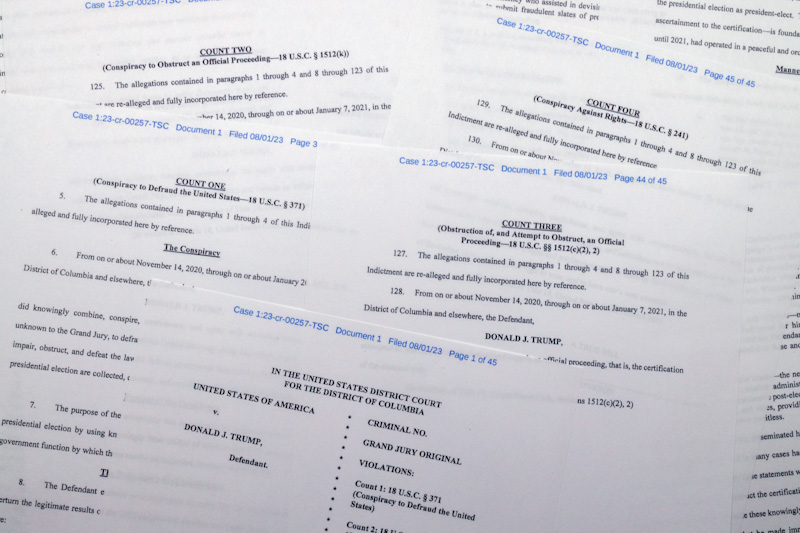Federal appeals court narrows federal judge's gag order in Trump election-interference case

The Aug. 1 indictment against former President Donald Trump alleges that he spread lies that election fraud changed the outcome of the 2020 election and he actually won. Trump knew that his claims were untrue, the indictment says. Photo by Jon Elswick/The Associated Press.
The U.S. Court of Appeals for the District of Columbia Circuit on Friday narrowed a gag order imposed on former President Donald Trump by a federal judge overseeing his election-interference case.
In the Dec. 8 opinion, the D.C. Circuit said Trump should be able to target special counsel Jack Smith in public statements. The appeals court also said Trump can make statements about several other personnel—in some circumstances that don’t harm the case.
The gag order imposed by U.S. District Judge Tanya Chutkan of Washington, D.C., applied to all parties and their lawyers and banned statements that “target” several personnel, including lawyers, parties, court personnel and reasonably foreseeable witnesses.
The appeals court said Chutkan’s order went too far, but she could restrict aspects of Trump’s speech “that present a significant and imminent risk to the fair and orderly administration of justice” when no less restrictive alternatives are available.
Applying that standard, the appeals court:
• Exempted from Chutkan’s gag order public statements about Smith.
• Allowed a ban on public statements about known witnesses or reasonably foreseeable witnesses concerning their potential participation in the investigation or in the criminal case.
• Narrowed the ban on statements about lawyers other than Smith, staff members for the court or lawyers, and family members of lawyers and staffers. The court said statements about those parties could be banned if made with the intent to materially interfere with work by lawyers or staff members in the case or with the knowledge that such interference is highly likely.
The court noted Trump also remains free to criticize the Biden administration and the U.S. Department of Justice—as noted in Chutkan’s gag order. He is also free to claim that the prosecution is politically motivated, or that he is innocent of the charges.
The appeals court said “two paramount constitutional interests” are involved—freedom of speech guaranteed by the First Amendment and federal courts’ Article III duty to ensure the fair and orderly administration of justice in criminal cases.
“We do not allow such an order lightly,” the appeals court said in an opinion by Judge Patricia Millett, an appointee of former President Barack Obama. “Mr. Trump is a former president and current candidate for the presidency, and there is a strong public interest in what he has to say. But Mr. Trump is also an indicted criminal defendant, and he must stand trial in a courtroom under the same procedures that govern all other criminal defendants. That is what the rule of law means.”
The case alleges that Trump conspired to overturn the 2020 presidential election and to obstruct the election’s certification. After his initial court appearance, he had posted on his social media account, “If you go after me, I’m coming after you!” He also accused former Vice President Mike Pence of going to the “dark side.”
Hat tip to Reuters, Politico and CNN, which covered the appeals court’s opinion.
See also:
“As 1 judge temporarily lifts Trump gag order, another says he’s ‘way beyond’ warning stage”
Write a letter to the editor, share a story tip or update, or report an error.



